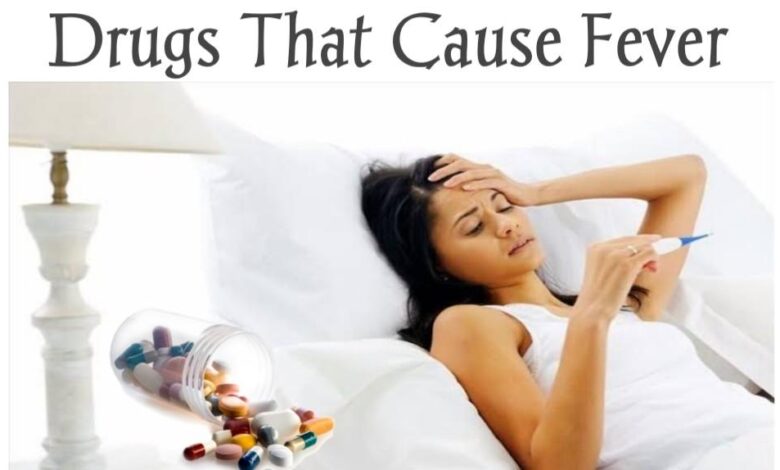List of Drugs That Can Cause Fever

What is drug-induced fever?
Drug-induced fever is defined as an elevation or rise in body temperature days or weeks after using a new drug or medication. Many common drugs can trigger fever in humans. Drug-induced fever manifests with a hectic fever pattern. Elevated temperatures of 102–104°F (39-40°C) are most common, but can range from 99°F to 109°F (38-43°C). Patients with drug fever will usually appear “inappropriately well” for the degree of fever that they have.
How does a drug or medication trigger fever?
The drugs induce fever by interfering with heat dissipation of the body peripherally. They can also increase the rate of metabolism, evoke a cellular or humoral immune response, mimic endogenous pyrogen, or damage tissues resulting in temperature rise.
Drugs can also cause fever by their pharmacological action or some other unrelated effect. Drug-induced fever is most commonly the result of a hypersensitivity reaction and its characteristics resemble those of an allergic reaction.
How long does drug-induced fever last?
Drug-induced fever most commonly occurs after 7 to 10 days of drug administration, persists as long as the drug is continued, disappears soon after stopping the drug, and will rapidly reappear if the drug is restarted.
Drug-induced fever examples
Examples of common drugs that induce fever, by mechanism:
Hypersensitivity
- Anticonvulsants
- Penicillin
- Minocycline
- Sulfonamide
- Allopurinol
Altered thermoregulatory mechanisms
- Thyroxine
- Anticholinergics
- Amphetamines
- Cocaine
Directly related to administration
- Paraldehyde
- Pentazocine
- Amphotericin B
- Bleomycin
Direct extension of pharmacologic action
Idiosyncratic
- Succinylcholine
- Haloperidol
- Serotonergic
Example of common drugs that induce fever, by drug class:
Antimicrobial medications that cause fever
- Amphotericin
- Carbapenems
- Cephalosporins (common)
- Erythromycin
- Isoniazid
- Minocycline
- Penicillins (common)
- Nitrofurantoin
- Rifampin
- Sulfonamides
- Vancomycin
Cardiovascular medications that cause fever
- Atropine
- Captopril
- Clofibrate
- Hydralazine
- Hydrochlorothiazide
- Methyldopa
- Nifedipine
- Procainamide (common)
- Quinidine (common)
- Streptokinase
Anticonvulsant medications that cause fever
- Barbiturates
- Carbamazepine (Tegretol)
- Phenytoin or Dilantin (common)
Gastrointestinal medications that cause fever
- Cimetidine (Tagemet)
- Ranitidine (Zantac)
- Phenothiazines
Analgesic medications that cause fever
Miscellaneous medications that cause fever
- Allopurinol
- Heparin
Can recreational drugs cause fever?
Yes, several recreational drugs can cause fever they include:
- Crystal Meth
- Cocaine
- Ecstacy (MDMA)
- Amphetamines.
Studies have shown most people with fever after a time at nightclubs/saunas/bars are often linked to recreational drug use.
How is a drug-induced fever treated?
Drug-induced fever begins to subside immediately after the implicated drug is stopped. However, the fever often reappears rapidly when the drug is restarted. Call your doctor immediately if you notice a drug is giving fever or your body temperature rises above normal after taking a medication or recreational drug.





